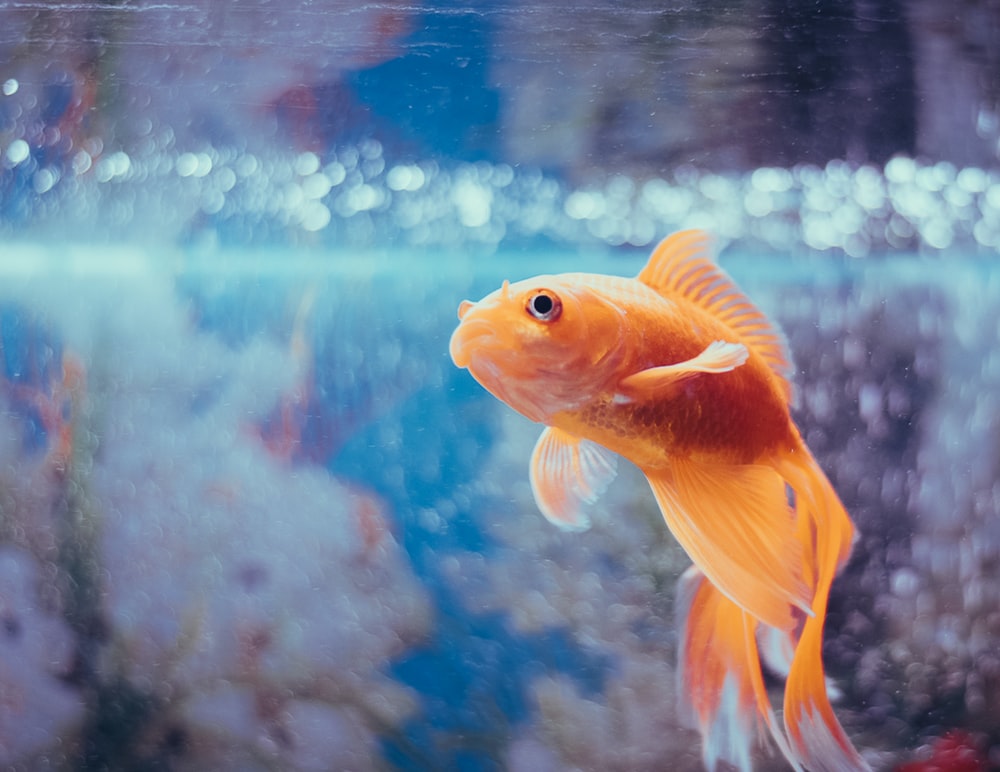As the old saying goes; ‘’ “Give a man a fish, and you’ll feed him for a day. Teach a man to fish, and you’ve fed him for a lifetime.”
And whilst we wouldn’t wish to be seen finessing these wise, sacred words, we think that ‘’give a man a fish tank, and he’ll never be lonely’’ sits nicely alongside them.
Well, perhaps not never. The average lifespan of pet fish is 3-5 years, with some larger fish surviving 5-10 years in a tank. If you’re keen to have a pet companion for life in the form of a fish, then it’s essential that you give your finned friend all that they need to survive.
Sure, lifespan depends primarily on the size and type of the fish you own, but the environment they live in can also impact hugely on their mortality. As such, pet owners and lonely souls should strive to maintain the best environment for their fish, ensuring companionship and curiosity for years to come.
With that in mind, here’s how to ensure your pet fish is happy and healthy in 6 steps.
ENSURE TANK COMFORT
Your fish needs sufficient tank space, and this obviously depends on the type of fish and their size. It is crucial to get a tank that is big enough for them to swim around in comfortably, as this is their work, rest and play all rolled into one, after all.
Generally speaking, the bigger the tank, the better. As an example, in the UK, goldfish are the most popular choice of pet fish. Your average sized goldfish will require a minimum of 20 gallons (around 90 litres) to move freely. With each additional fish, an extra 20 gallons should be added. In terms of size rather than capacity, 20 gallons equates to roughly 76cm by 38cm by 30.5 cm (length/width/height). This is considered a medium-sized fish tank.
When considering what your fish needs to remain content in their tank, you should also think about introducing entertainment features, toys, rocks, or even kelp and plants to their tank for them to frolic amongst.
Ensuring a consistent temperature which is as close to their natural environment as possible – not too hot or too cold – is absolutely essential, too. This depends on the species once again, but as a general rule, between 24°C and 27°C for tropical fish and between 18°C and 23°C for cool water fish (such as goldfish) is what you should be aiming for. To achieve the tropical fish’s optimum temperature, a tank heater will be needed. For cool water fish, their preferred ambience usually coincides with room temperature in the UK.
A fish tank thermometer is essential for monitoring the temperature of the water, and as we already mentioned, consistency is king. Should your fish tank be next to a window or door, or it’s exposed to changing levels of natural sunlight throughout the day, you may find it hard to keep this consistency of temperature. As a result, your fish may find it hard, too.

MAINTAIN OXYGEN LEVELS AND FILTRATION
After selecting a good tank size for your fish, as well as decorating it strategically, it is vital that you get your oxygen levels right.
Tank management is impossible without the right tools to provide oxygen to your fish, and you’ll need an air pump or air stone to ensure proper air circulation. Keep in mind that in addition to your fish requiring oxygen to breathe, any tank plants and beneficial bacteria within the tank also require – and therefore, deplete – oxygen in your tank.
If you have found your fish gasping for air at the top of the tank, your filtration system may not be reliable or working properly. Some ways to increase depleted oxygen levels are to:
- check your air pump is working properly – including the tubing.
- get some air stones or air bubblers which pop at the surface.
- replace 10-25% of the tank’s water every 1-2 weeks (if urgently low, replace up to 50% of the water).
- remove excess uneaten food regularly.
- remove dying plants and any other dead or decaying matter, such as snails or fish.
- balance and maintain low nitrate and ammonia levels.
- consider a filtration system that is battery-operated if power outages or snowstorms are compromising its steady operation.
- never leave your filter off for more than about 10 hours at a time.
FOOD
Chatting with a professional who boasts expertise on the breed of fish you’re caring for will help inform your feeding schedule. As a general rule of thumb, larger, more slow moving (or even still!) fish can go longer periods without food. Smaller fish – who tend to be more lively and active in their fish tank – require feeding once or twice a day.
There are some people who feed their fish in small amounts several times a day, but if you are feeding less frequently (because you’re not at home all day, for instance), make sure you give enough food in each serving.
However, it is essential to note that overfeeding is usually a bigger issue than underfeeding. If your fish are resting at the bottom of the tank and there is food that remains uneaten, this is typically an indication that you’ve given your fish too much food. Developing a feeding schedule won’t just be more simple for you, but it can also help reduce the stress levels of your pet. Though their memories may be short and their attention spans slight, pet fish just love consistency, after all!
GET YOUR FISH A BUDDY
This tip might smart somewhat after we suggested that a pet fish makes a cracking companion. But let’s face it; the little guy needs someone their own species to frolic with, too. You’re just too large and too human to join them in the tank, so it’s your duty to provide your pet fish with a friend.
Though fish cannot experience loneliness the same way humans do, there is evidence suggesting that certain types of fish enjoy some level of company, with many getting stressed if they’re alone in their tank. Pairing your fish up with a companion, then, is a kind move which will help contribute to its longevity.
DID YOU KNOW FISH EXPERIENCE STRESS?
Stress is exhibited in several ways, but some of the following signs can give you a clue that your fish might be stressed. Your fish might: avoid food, swim in strange directions, swim frantically for no reason, rub himself against the rocks or objects in the tank, or even lay on the bottom of the tank. Stress significantly lowers mortality and is a common reason why fish die prematurely.
You should also be aware of ammonia stress. Lethargy, a lack of appetite, gasping at the surface, dwelling at the bottom of the tank, and red streaks or inflammation around the anus, fins, or eyes, may indicate that ammonia levels are too high. Keep levels low through sufficient water filtration and oxygenation.
SWITCH OFF LIGHTS AT NIGHT
This tip may sound strange, but fish may also benefit from a period of darkness in which they can rest. Additionally, having some darkness also benefits the plants in the tank and can help slow down algae growth, and can also mitigate a risk of your fish tank overheating, too.
As a loose rule, fish should be exposed to light for around half the day, with their other twelve hours in darkness. Without any light, most fish lose their bright, arresting colours, and may forget to eat, too.
THE BOTTOM LINE
Just like the gravel lurking at the bottom of your fish tank, we’re in need of clearing, too. Clearing off, that is. Goodbye!





